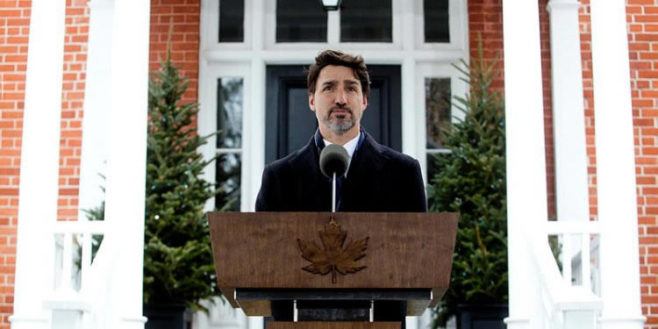The border between the U.S. and Canada has been closed to non-essential travel because of the COVID-19 pandemic.
U.S. President Donald Trump and Canadian Prime Minister Justin Trudeau spoke on March 18 to discuss coordination and steps to protect the health and safety of their citizens.
“They agreed to temporarily restrict non-essential travel across the Canada-U.S. border,” according to a statement released by Trudeau’s office.
“Travellers will no longer be permitted to cross the border for recreation and tourism,” the statement declared.
The statement also noted that Trump and Trudeau “agreed that essential travel will continue and recognized that it is critical we preserve supply chains between both countries”.
“These supply chains ensure that food, fuel, and life-saving medicines reach people on both sides of the border,” the statement read.
Also on March 18, Trudeau’s office released a statement noting that the government is “taking strong and quick action to protect our economy, and the health, safety, and jobs of all Canadians during the global COVID-19 outbreak”.
Trudeau announced a new set of economic measures to help stabilize the economy and help Canadians affected by the impacts of this challenging period, to the tune of $82 billion.
“These measures, delivered as part of the Government of Canada’s COVID-19 Economic Response Plan, will provide up to $27 billion in direct support to Canadian workers and businesses, plus $55 billion to meet liquidity needs of Canadian businesses and households through tax deferrals to help stabilize the economy.
“Combined, this $82 billion in support represents more than 3 per cent of Canada’s GDP. This wide-ranging support will help ensure Canadians can pay for rent and groceries, and help businesses continue to pay their employees and their bills during this time of uncertainty.
“This plan builds on coordinated action taken since the beginning of this outbreak, including the more than $1 billion COVID-19 Response Fund, which provided funding to provinces and territories to strengthen critical health care systems. It represents over $500 billion in credit and liquidity support for people and businesses through cooperation between financial Crown corporations, the Bank of Canada, the Office of the Superintendent of Financial Institutions (OSFI), and commercial lenders to ensure businesses can continue to operate,” the statement read.
In the statement, Trudeau said: “No Canadian should have to worry about paying their rent or buying groceries during this difficult time.”
“That is why we are taking the strong action needed to stabilize our economy and help those impacted by the COVID-19 virus. Together, we will get through this difficult time,” Trudeau said.
Based on its March 18 situation report, the World Health Organization announced that there are 191, 127 confirmed cases of COVID-19 worldwide.
Also, as of the same day, 7,807 people have died because of the novel coronavirus.
As of March 18 at 5:20 p.m. Eastern time, Health Canada reported that there were 621 confirmed cases of COVID-19 in the country, and 35 probable cases.
According to Health Canada, the onset of the illness in these cases occurred between January 15 and March 15, 2020.
Fifty-two percent of cases in Canada are male. Also, 31 percent of cases are 60 years old and over.
Health Canada also noted that 11 percent of cases have been hospitalized.
Nine people have died of COVID-19 in Canada.








